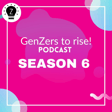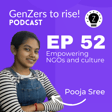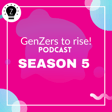
Behind the life of a painter with Marina Tziara
On this podcast we have featured YouTubers, influencers, photographers, videographers, public speakers, activists, musicians. It’s time to talk with a painter. With me in the studio is Marina Tziara. She had one of her exhibitions at Grenoble, in France. And this is how I met her.
In today’s episode we will talk about the journey of a painter. The difficulties of being in the art industry. In addition to that Marina will share with us some insights about her latest exhibition - the preparation behind it and the process of being in a gallery collaboration. Are there any hidden stories ? Let’s find out.
You can connect with Marina Tziara at https://lnkfi.re/marina-tziara
Follow GenZers to rise! https://go.changemakerz.org/follow
Episode's page https://podcast.changemakerz.org/marina-tziara
Access exclusive content on the ChangemakerZ app at https://app.changemakerz.org
Produced by Vasilis Skarleas



















